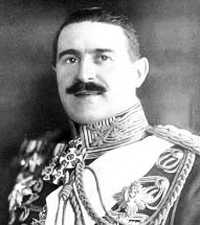Petar Živković
| Petar Živković | |
|---|---|
 | |
| 11th Prime Minister of Yugoslavia | |
| In office 7 January 1929 – 4 April 1932 | |
| Monarch | Alexander I |
| Preceded by | Anton Korošec |
| Succeeded by | Vojislav Marinković |
| Minister without Portfolio | |
| In office 1943–1943/45 | |
| Monarch | Peter II |
| Preceded by | None |
| Succeeded by | None |
| Personal details | |
| Born | 1 January 1879 Negotin, Serbia |
| Died | 3 February 1947 (aged 68) Paris, France |
| Nationality | Yugoslav |
| Political party | Yugoslav Radical Peasants' Democracy Yugoslav National Party |
| Religion | Serbian Orthodox |
| Military service | |
| Allegiance | Yugoslavia |
| Service/branch | Royal Yugoslav Army |
| Years of service | 1903-1943 |
| Rank | General of the Army |
| Battles/wars | World War I |
Petar Živković (Cyrillic script: Петар Живковић; 1 January 1879 – 3 February 1947) was a Serbian soldier and political figure in Yugoslavia. He was Prime Minister of the Kingdom of Yugoslavia from January 7, 1929 until April 4, 1932.
Life
Petar Živković was born in Negotin, Principality of Serbia (present-day Bor District, Serbia) in 1879. A soldier at the Serbian court, he helped to overthrow the House of Obrenović, with the assassination of King Aleksandar Obrenović. He later became a member of the White Hand, which opposed the Serbian nationalism of the Black Hand. In 1921, Alexander I of Yugoslavia appointed Živković commander of the Palace Guards; in 1929 he was appointed prime minister.
Živković held the office as a member of the Yugoslav Radical Peasants' Democracy, or JRSD, which was soon the only legal party in Yugoslavia, due to his electoral "reforms." He resigned as prime minister in 1932, and shortly thereafter founded the Yugoslav National Party, becoming its president in 1936.
Meanwhile, Alexander I had been assassinated, in 1934; his cousin Pavle Karađorđević took office as regent for the 11-year-old Petar II. Upon Pavle's 1941 signing of the Tripartite Pact, Živković left Yugoslavia, ahead of the Nazi invasion (see Balkans Campaign). He became part of the Yugoslav government in exile.
In 1946 he was tried in absentia in Yugoslavia and sentenced to death. He remained in exile in France, dying in Paris in 1947, aged 68.
References
External links
- "Zivkovic, Petar." Encyclopædia Britannica Premium Service.
| Political offices | ||
|---|---|---|
| Preceded by Anton Korošec |
Prime Minister of Yugoslavia 1929–1932 |
Succeeded by Vojislav Marinković |
| New office | Minister without Portfolio 1943–1943/45 |
Abolished |
| |||||||||||
| Wikimedia Commons has media related to Petar Zivanic. |